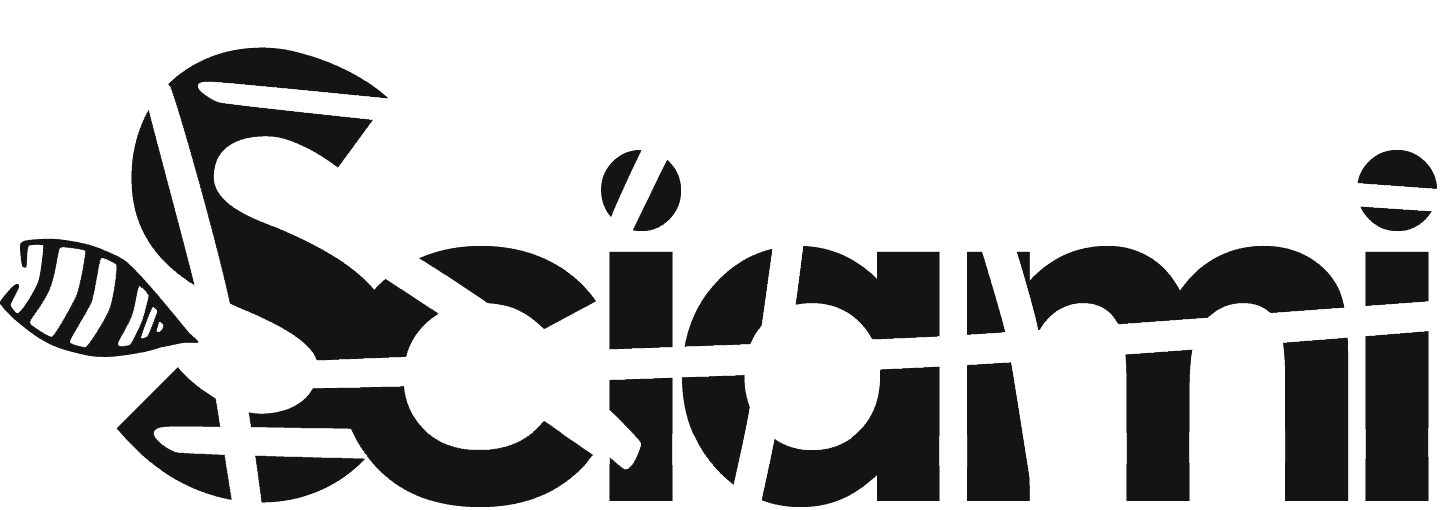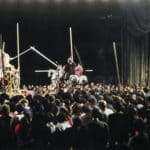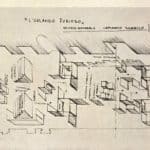Orlando Furioso (1969).
From Ludovico Ariosto
Scenic reduction of the text by Edoardo Sanguineti
Directed by Luca Ronconi
Scenes by Umberto Bertacca
Costumes by Elena Mannini
Music by Salvatore Sciarrino
Production by Cooperativa: Teatro Libero
First performance: Spoleto, Festival of the Two Worlds, Church of San Niccolò, 4 July 1969
With (in alphabetical order) : Edmonda Aldini (Bradamante), Dorotea Aslanidis (Isabella), Rodolfo Baldini (Arbante, Guidon Selvaggio, Pastore, Lo sdegno), Marco Bereneck (Bireno, Agramante), Nino Bignamini (Folletto messaggero, Armato di Cimosco, Orrilo, Soldato saracino, Folletto), Paolo Bonetti (Armato di cimosco, Dardinello, Il greco), Emilio Bonucci (Oste, Popolo del Cairo, Soldato saracino, Fausto Latini), Liù Bosisio (Alcina, Gabrina, Balia di Argia), Pierangelo Civera (Pirabello, Il signore del nappo), Enzo Consoli (Zerbino), Ambra Danon (Donzella di Ebuda, Parigina, Moglie di Iocondo), Duilio Del Prete (Astolfo), Luca Demata (Nano di Gradasso, Nano di Doralice, Nano saracino, Nano della Regiana), Luigi Diberti (Ruggiero), Alberto Donatelli (Grifone, Soldato saracino), Antonio Fattorini (Rinaldo), Massimo Foschi (Orlando), Marco Galletti (Gradasso, Caligorante, Adonio), Cesare Gelli (Ferraú, Cimosco re frisone, Mandricardo), Graziano Giusti (Mago Atlante, Carlo Magno, Anselmo giudice), Maria Grazia Grassini (Marfisa), Pino Manzari (Ladrone, Soldato saracino, Eremita), Marzio Margine (Medoro), Mariangela Melato (Olimpia, Fiordispina), Maurizio Merli (Oberto, Parigino, Ricciardetto), Aldo Miranda (Cittadino di Ebuda, Aquilante, Soldato saracino, Servo di Anselmo), Carlo Montagna (Sacripante, Rodomonte), Sergio Nicolai (Corsaro di Ebuda, Soldato saracino, Iocondo), Daria Nicolodi (Figlia di Cimosco, Doralice, Fiammetta), Anna Niccora (Femmina omicida, Violante), Ottavia Piccolo (Angelica), Michele Placido (Figlio dell’oste, Popolo del Cairo, Soldato saracino, Garzone di Iocondo), Giancarlo Prati (Messaggero a cavallo, Pastorello fatato, Popolo del Cairo, Parigino, Astrologo), Armando Pugliese (Vecchio olandese in barca, Frate parigino, Malagigi), Aldo Puglisi (L’eremita, Corsaro di Ebuda Etiopo sozzo), Anna Rossini (Regina omicida, Parigina, Argia), Rosabianca Scerrino (Fata Melissa, Donna serpente), Paola Tanzani (Donzella di Pinabello, Parigina, Signora del nappo), Gabriele Tozzi (Armato di Cimosco, Capitano di Doralice, Cloridano, Astolfo re dei Longobardi), Renata Zamegno (Femmina omicida, Regina longobarda).
Presentation
by Mauro Sabatini
The origin of Orlando Furioso, one of the most famous and celebrated plays of late twentieth century Italian theater, lies in Luca Ronconi’s fascination with Edoardo Sanguineti’s novel Il Giuoco dell’Oca, published in 1967, the year of the Ivrea Conference. “He liked the idea of a non-sequential, disorganized story, but with a somehow open, random editing, and the issue had been raised of how an analogous effect might be achieved in a theater context, if one took account of all the specific questions that theater raises.”
The initial intention was to trace a “game of the goose” on the theater scene, by adopting a dramatic mazelike structure and a montage that would achieve a dual involvement and disorientation of spectators through a deliberately “popular” composition. The idea was to use a dramatic text that could – evidently according to Sanguineti and Ronconi’s cultural standards – sound familiar or recognizable to spectators, striving not to betray the guiding principles contained in the text and yet imposing a radical transformation of them: “I don’t even know if at the start there was already an intention to do Orlando Furioso. There was rather the idea of a generic text that would be fairly familiar to the public. I think that Orlando wasn’t necessarily the text we immediately had in mind.”
The adaptation of Ariosto’s text by Sanguineti and Ronconi aimed at maintaining the salient features of Orlando Furioso, though re-elaborated in space-time according by the constructive device of simultaneity, already detectable in the intrinsic structure of this poem about chivalry – a thousand stories and parallel subplots that unravel around the main plot. The adventures of the story are isolated, selected, addressed in four macro-themes, so that “the spectators, divided into groups, will follow, from among the strands we present, those they prefer”: a grotesque one, an erotic one, an epic one, a fantastic one, etc. If already in Sanguineti and Ronconi’s adaptation of the text they broke up its wholeness into a constellation of visual pictures that aimed at an effective autonomy, the construction of the performing space pursued the idea of a complex environment in which different narrative paths operated at once, forcing the spectators to choose and to get an almost inevitably partial vision of the work.
Documents are published in original language. In case the translation is present, both the original and the translation are published.
Claudio Longhi, Conversation with Edoardo Sanguineti, in Claudio Longhi, Orlando furioso: un travestimento ariostesco di Edoardo Sanguineti ediz. Il Nove, 1996
Claudio Longhi, Conversation with Luca Ronconi, in Claudio Longhi, Orlando furioso: un travestimento ariostesco di Edoardo Sanguineti ediz. Il Nove, 1996
Claudio Longhi, Conversation with Uberto Bertacca, in Claudio Longhi, Orlando furioso: un travestimento ariostesco di Edoardo Sanguineti ediz. Il Nove, 1996
Claudio Longhi, Conversation with Salvatore Sciarrino, in Claudio Longhi, Orlando furioso: un travestimento ariostesco di Edoardo Sanguineti ediz. Il Nove, 1996
Alberto Blandi, Ariosto «drive in» al Festival di Spoleto, «La Stampa», July 6, 1969
Aggeo Savioli, L'umanità vista come una gabbia di matti, «l'Unità», July 6, 1969
Corrado Augias, Il trionfo del meraviglioso, «Sipario», n° 280, August 1969
Cristina Reggio, Orlando Furioso di Luca Ronconi, «Sciami», 2015
Orlando furioso on Luca Ronconi's website




